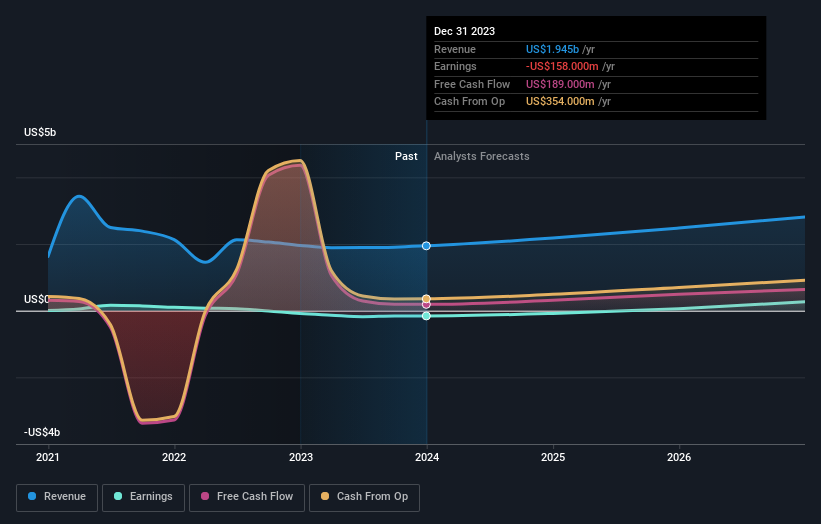Stock Analysis
- United States
- /
- Real Estate
- /
- NasdaqGS:ZG
Further weakness as Zillow Group (NASDAQ:ZG) drops 6.1% this week, taking three-year losses to 70%

It's not possible to invest over long periods without making some bad investments. But really big losses can really drag down an overall portfolio. So spare a thought for the long term shareholders of Zillow Group, Inc. (NASDAQ:ZG); the share price is down a whopping 70% in the last three years. That might cause some serious doubts about the merits of the initial decision to buy the stock, to put it mildly. Shareholders have had an even rougher run lately, with the share price down 23% in the last 90 days.
Given the past week has been tough on shareholders, let's investigate the fundamentals and see what we can learn.
See our latest analysis for Zillow Group
Zillow Group isn't currently profitable, so most analysts would look to revenue growth to get an idea of how fast the underlying business is growing. Shareholders of unprofitable companies usually desire strong revenue growth. As you can imagine, fast revenue growth, when maintained, often leads to fast profit growth.
In the last three years Zillow Group saw its revenue shrink by 9.8% per year. That is not a good result. The share price fall of 19% (per year, over three years) is a stern reminder that money-losing companies are expected to grow revenue. We're generally averse to companies with declining revenues, but we're not alone in that. Don't let a share price decline ruin your calm. You make better decisions when you're calm.
The graphic below depicts how earnings and revenue have changed over time (unveil the exact values by clicking on the image).

Zillow Group is well known by investors, and plenty of clever analysts have tried to predict the future profit levels. If you are thinking of buying or selling Zillow Group stock, you should check out this free report showing analyst consensus estimates for future profits.
A Different Perspective
While the broader market gained around 21% in the last year, Zillow Group shareholders lost 6.9%. Even the share prices of good stocks drop sometimes, but we want to see improvements in the fundamental metrics of a business, before getting too interested. On the bright side, long term shareholders have made money, with a gain of 4% per year over half a decade. It could be that the recent sell-off is an opportunity, so it may be worth checking the fundamental data for signs of a long term growth trend. It's always interesting to track share price performance over the longer term. But to understand Zillow Group better, we need to consider many other factors. Consider risks, for instance. Every company has them, and we've spotted 1 warning sign for Zillow Group you should know about.
We will like Zillow Group better if we see some big insider buys. While we wait, check out this free list of growing companies with considerable, recent, insider buying.
Please note, the market returns quoted in this article reflect the market weighted average returns of stocks that currently trade on American exchanges.
Valuation is complex, but we're helping make it simple.
Find out whether Zillow Group is potentially over or undervalued by checking out our comprehensive analysis, which includes fair value estimates, risks and warnings, dividends, insider transactions and financial health.
View the Free AnalysisHave feedback on this article? Concerned about the content? Get in touch with us directly. Alternatively, email editorial-team (at) simplywallst.com.
This article by Simply Wall St is general in nature. We provide commentary based on historical data and analyst forecasts only using an unbiased methodology and our articles are not intended to be financial advice. It does not constitute a recommendation to buy or sell any stock, and does not take account of your objectives, or your financial situation. We aim to bring you long-term focused analysis driven by fundamental data. Note that our analysis may not factor in the latest price-sensitive company announcements or qualitative material. Simply Wall St has no position in any stocks mentioned.
About NasdaqGS:ZG
Zillow Group
Zillow Group, Inc. operates real estate brands in mobile applications and Websites in the United States.
Excellent balance sheet with reasonable growth potential.

